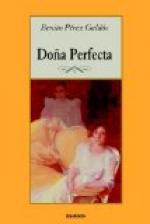W. D. HOWELLS.
DONA PERFECTA
CHAPTER I
Villahorrenda! Five minutes!
When the down train No. 65—of what line it is unnecessary to say—stopped at the little station between kilometres 171 and 172, almost all the second-and third-class passengers remained in the cars, yawning or asleep, for the penetrating cold of the early morning did not invite to a walk on the unsheltered platform. The only first-class passenger on the train alighted quickly, and addressing a group of the employes asked them if this was the Villahorrenda station.
“We are in Villahorrenda,” answered the conductor whose voice was drowned by the cackling of the hens which were at that moment being lifted into the freight car. “I forgot to call you, Senor de Rey. I think they are waiting for you at the station with the beasts.”
“Why, how terribly cold it is here!” said the traveller, drawing his cloak more closely about him. “Is there no place in the station where I could rest for a while, and get warm, before undertaking a journey on horseback through this frozen country?”
Before he had finished speaking the conductor, called away by the urgent duties of his position, went off, leaving our unknown cavalier’s question unanswered. The latter saw that another employe was coming toward him, holding a lantern in his right hand, that swung back and forth as he walked, casting the light on the platform of the station in a series of zigzags, like those described by the shower from a watering-pot.
“Is there a restaurant or a bedroom in the station of Villahorrenda?” said the traveller to the man with the lantern.
“There is nothing here,” answered the latter brusquely, running toward the men who were putting the freight on board the cars, and assuaging them with such a volley of oaths, blasphemies, and abusive epithets that the very chickens, scandalized by his brutality, protested against it from their baskets.
“The best thing I can do is to get away from this place as quickly as possible,” said the gentlemen to himself. “The conductor said that the beasts were here.”
Just as he had come to this conclusion he felt a thin hand pulling him gently and respectfully by the cloak. He turned round and saw a figure enveloped in a gray cloak, and out of whose voluminous folds peeped the shrivelled and astute countenance of a Castilian peasant. He looked at the ungainly figure, which reminded one of the black poplar among trees; he observed the shrewd eyes that shone from beneath the wide brim of the old velvet hat; the sinewy brown hand that grasped a green switch, and the broad foot that, with every movement, made the iron spur jingle.




